
- Home
- Media Center
-
Events
- Wuzhen Summit
- Regional Forums
- Practice Cases of Jointly Building a Community with a Shared Future in Cyberspace
- World Internet Conference Awards for Pioneering Science and Technology
- The Light of Internet Expo
- Straight to Wuzhen Competition
- Global Youth Leadership Program
- WIC Distinguished Contribution Award
- Membership
- Research & Cooperation
- Digital Academy
-
Reports
- Collection of cases on Jointly Building a Community with a Shared Future in Cyberspace
- Collection of Shortlisted Achievements of World Internet Conference Awards for Pioneering Science and Technology
- Reports on Artificial Intelligence
- Reports on Cross—Border E—Commerce
- Reports on Data
- Outcomes of Think Tank Cooperation Program
- Series on Sovereignty in Cyberspace Theory and Practice
- Other Achievements
- About WIC
- 中文 | EN

Collection: openEuler open source OS
The openEuler platform is positioned as an enterprise-class, reliable, and secure digital infrastructure operating system that unleashes diversified computing power. Open source contributes to the creation of a sustainable future. With the goal of building an open, diversified, and architecture-inclusive software ecosystem, the openEuler open source community is available to global developers. As a superior operating system for all scenarios, it supports multi-architecture computing, including server, cloud, edge, and embedded applications.
Full Support for All-Scenario Digital Infrastructure Devices
All-scenario OS: openEuler proposes full-stack atomic decoupling in order to support flexible versioning and service combining. This OS supports server, cloud, edge, and embedded scenarios using a unified OS architecture.
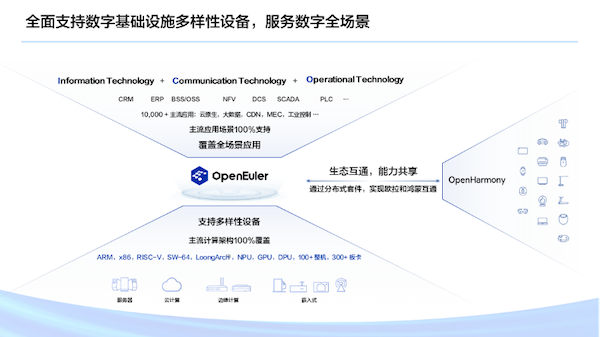
A Unified OS Architecture for Diversified Devices (Southbound) and All Application Scenarios (Northbound) Interconnecting with OpenHarmony for Shared Ecosystem Capabilities
1. Diversified computing power: openEuler supports mainstream chips such as Intel, AMD, Kunpeng, Phytium, Zhaoxin, Loongson, Hygon, and ShenWei chips, and multiple processing units such as NPUs, GPUs, and DPUs. It also has complete test specifications for hardware and software compatibility. It meets requirements for diversified computing capabilities in the digital era.
2. Convergence for all scenarios: openEuler unifies kernel, build, SDK, connection, and development tool capabilities in order to resolve OS-device incompatibility issues, resulting in a 10% to 15% improvement in performance. Developers can design applications that run natively on openEuler by using a developer-friendly toolkit provided by openEuler.
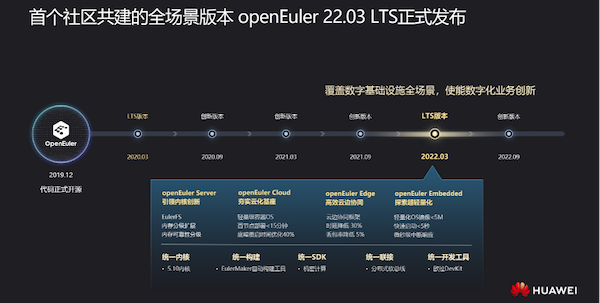
openEuler 22.03 LTS Released
3. Distributed soft bus: Interconnects openEuler and OpenHarmony. Combined with OpenHarmony, which covers terminal devices, the two operating systems provide an ecosystem of software for all aspects of digital life.
4.Promoted technological innovation and standardization: Submitted 328 patent applications, of which 248 were accepted; led and co-initiated 8 standards, and won 15 awards.
Vibrant Ecosystem with Rapid Growth and Large-Scale Application
Commercial releases launched by major partners: The 16 major OS vendors have launched their commercial releases based on openEuler community releases, including Kylinsoft, Uniontech, Kylinsec, SUSE, iSoft, Turbolinux, xFusion, H3C, ThunderSoft, Kyland, Institute of Software, Chinese Academy of Sciences (ISCAS), Hoperun, Red Flag Linux, NFS China, Linx, and Tongyuan.
In-house releases developed by top enterprises: Companies in various industries, including China Mobile, China Telecom, China Unicom, Baidu, and Huawei Cloud, have developed their own operating systems based on openEULer community releases.
Large-scale application in various industries: Over 1.7 million openEuler-based operating systems have been installed in various industries, including the public sector, carriers, finance, energy, transportation, and the Internet. In 2022, there are expected to be more than 3 million installations.
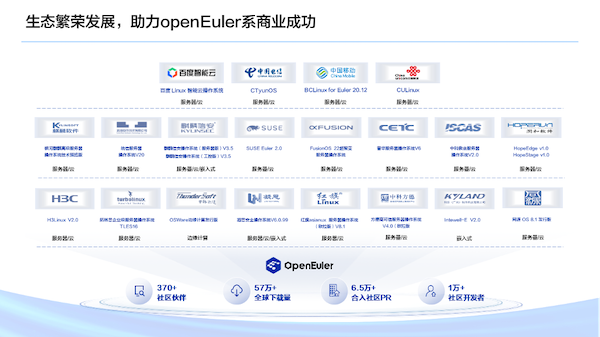
openEuler-based Distributions Launched by Major OS Vendors and Top Enterprises
Empowering Digital Transformation, Leading OS Technology Innovation, and Contributing to Open Source Construction
1. The openEuler team is committed to the development of innovative kernels. Taking the lead in Linux Kernel versions 5.10 and 5.14, Huawei is a member of the openEuler open source community.
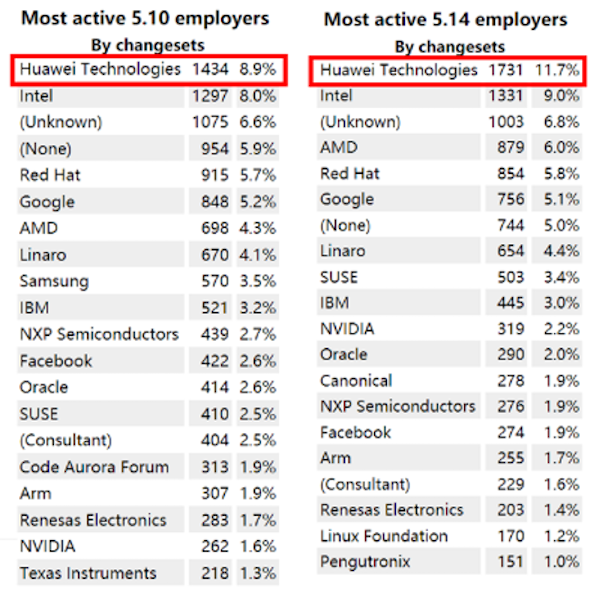
Huawei Ranks No.1 in Contribution to Linux Kernel 5.10
The openEuler-based operating systems of more than 1.7 million sets have been installed in various industries and are currently running in the core systems of major corporations.
2. The openEuler open source community consists of more than 370 partners across the industry chain.

370+ Partners Across the Industry Chain
Throughout the open source ecosystem in China, openEuler's practices in technology, community, business, ecosystem, talent, and open source atmosphere serve as an example.
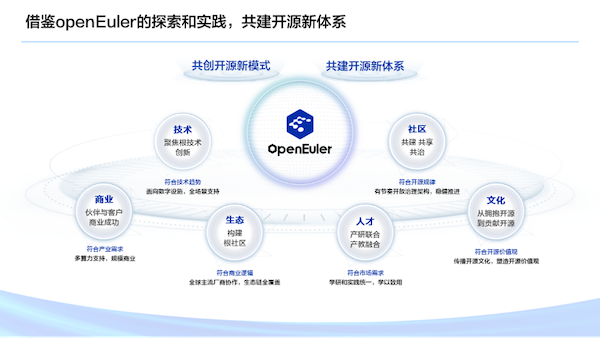
openEuler Exploration and Practices
openEuler mirrors have been set up outside China. Up to 550,000 downloads have been completed by users and developers in more than 1,500 cities in 120 countries and regions.

The World Internet Conference (WIC) was established as an international organization on July 12, 2022, headquartered in Beijing, China. It was jointly initiated by Global System for Mobile Communication Association (GSMA), National Computer Network Emergency Response Technical Team/Coordination Center of China (CNCERT), China Internet Network Information Center (CNNIC), Alibaba Group, Tencent, and Zhijiang Lab.





